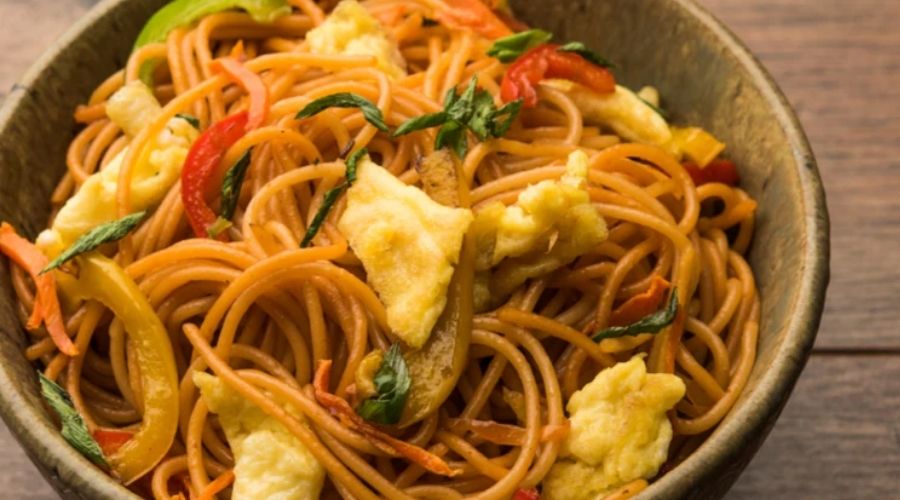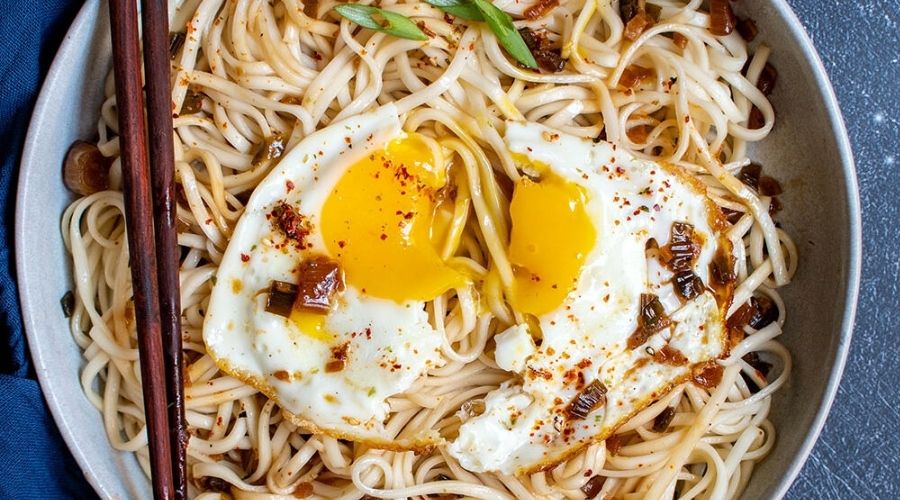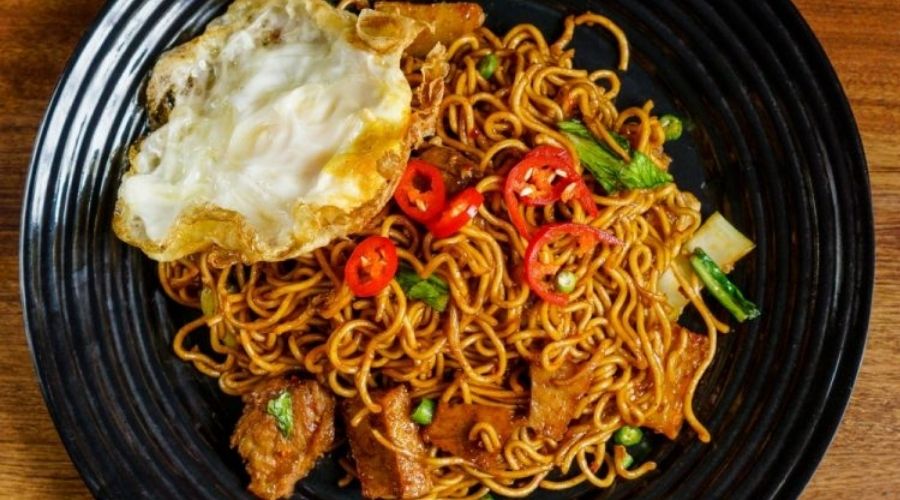Cooked egg noodles are a versatile and delicious staple in many cuisines, perfect for everything from hearty casseroles to quick stir-fries.
However, knowing how to store cooked egg noodles properly is crucial to maintaining their texture and flavor, as well as ensuring food safety.
Whether you’ve made a large batch for meal prep or have leftovers from dinner, proper storage techniques can help you enjoy your noodles at their best.
In this article, we will explore the best methods for storing cooked egg noodles, how to identify spoilage, and tips for reheating them effectively.
Why Storing Cooked Egg Noodles Properly Matters
Storing cooked egg noodles properly is crucial for preserving their quality, flavor, and safety.
When cooked, egg noodles can become a breeding ground for bacteria if not handled correctly, leading to foodborne illnesses.
Proper storage methods not only extend the shelf life of your noodles but also maintain their texture and taste, ensuring that they remain enjoyable in your meals.
If left at room temperature for too long, cooked egg noodles can dry out or become mushy, compromising their culinary appeal.
By following safe storage practices, such as refrigerating or freezing, you can enjoy the convenience of having delicious noodles ready for your next dish while minimizing waste and maximizing freshness.
Whether you’re preparing a hearty pasta dish or a quick stir-fry, understanding the importance of proper storage will enhance your cooking experience and ensure food safety.
How to Store Cooked Egg Noodles

Storing cooked egg noodles properly is essential for maintaining their freshness, texture, and safety.
Here’s a comprehensive guide to help you store your noodles effectively:
1. Cool Them Down
After cooking, allow the egg noodles to cool to room temperature. Spreading them out on a baking sheet can help speed up the cooling process.
Avoid leaving them out for more than two hours to prevent bacterial growth.
2. Use Airtight Containers
Transfer the cooled egg noodles into airtight containers. These containers help keep moisture in and protect the noodles from absorbing any odors from your fridge.
Glass or BPA-free plastic containers are ideal choices.
3. Label and Date
Always label your containers with the date of storage. This practice will help you keep track of how long the noodles have been stored and ensure they are consumed within a safe timeframe.
4. Refrigeration
Store the airtight containers in the refrigerator. Cooked egg noodles can typically last for about 3 to 5 days when properly refrigerated.
Make sure your fridge is set to a temperature below 40°F (4°C).
5. Freezing for Long-Term Storage
If you want to keep your cooked egg noodles for a longer period, consider freezing them. Spread the noodles in a single layer on a baking sheet and freeze until solid.
Then, transfer them to freezer-safe bags or containers, removing as much air as possible. Cooked egg noodles can be frozen for up to 3 months.
6. Reheating
When you’re ready to use the stored noodles, check for any signs of spoilage before reheating.
You can reheat them on the stovetop with a bit of water or broth to restore their texture, or microwave them in short intervals until heated through.
7. Avoid Overcooking During Reheating
Be careful not to overcook the noodles during reheating, as they can become mushy. Stir gently and monitor the temperature to ensure they are warmed through without losing their texture.
By following these steps, you can effectively store cooked egg noodles, ensuring they remain delicious and safe to eat for days to come!
What to Look for While Storing Cooked Egg Noodles

When storing cooked egg noodles, there are several key factors to consider to ensure they remain fresh, safe, and enjoyable.
Here’s what to look for:
1. Cooling Temperature
Before storing, make sure the cooked egg noodles have cooled down to room temperature.
This helps prevent condensation inside the storage container, which can lead to spoilage. Ideally, they should be stored within two hours of cooking.
2. Quality of Containers
Choose high-quality, airtight containers made from glass or BPA-free plastic. These types of containers protect the noodles from moisture and external odors while maintaining their texture.
3. Signs of Spoilage
Inspect the noodles for any signs of spoilage before storing. Look for discoloration, off odors, or a slimy texture.
If you notice any of these signs, it’s best to discard them to avoid foodborne illness.
4. Proper Storage Environment
Ensure your refrigerator is set to a temperature below 40°F (4°C) to keep the noodles safe. If you plan to freeze them, make sure your freezer is at 0°F (-18°C) or lower for optimal storage.
5. Storage Duration
Be mindful of how long the noodles have been stored. In the refrigerator, cooked egg noodles should be consumed within 3 to 5 days.
If frozen, they can last up to 3 months, but should be used within that timeframe for the best quality.
6. Avoid Overcrowding
When placing cooked egg noodles in a storage container, avoid overcrowding.
This allows for better airflow and prevents the noodles from clumping together, making them easier to separate when reheating.
7. Labeling
Always label your containers with the date of storage. This practice helps you keep track of how long the noodles have been stored and ensures you consume them within the safe period.
By paying attention to these factors, you can effectively store cooked egg noodles and enjoy them at their best!
How to Choose the Right Accessories for Storing Cooked Egg Noodles

Selecting the right accessories for storing cooked egg noodles is essential to maintain their freshness and quality.
Here’s a guide to help you choose the best storage options:
1. Airtight Containers
Opt for airtight containers made of glass or BPA-free plastic. These materials prevent air and moisture from getting in, which helps keep the noodles fresh and prevents spoilage.
Look for containers with secure lids that create a tight seal.
2. Portion-Sized Containers
If you often use cooked egg noodles in specific portions, consider using smaller, portion-sized containers.
This makes it easier to store and access just the amount you need without exposing the entire batch to air and potential contamination.
3. Freezer-Safe Bags
For long-term storage, freezer-safe resealable bags are an excellent option.
They take up less space in the freezer and can be easily labeled with the date.
Remove as much air as possible before sealing to prevent freezer burn.
4. Vacuum Sealers
If you have a vacuum sealer, this is a great tool for preserving cooked egg noodles.
Vacuum sealing removes air and helps prevent freezer burn, allowing you to store noodles for an extended period while retaining their quality.
5. Labels and Markers
Use labels and markers to clearly mark containers and bags with the date of storage.
This helps you keep track of how long the noodles have been stored and ensures you use them within a safe timeframe.
6. Stackable Storage Options
Consider stackable containers if you have limited storage space.
These containers maximize vertical space in your refrigerator or freezer, making it easier to organize your food while saving space.
7. Microwave-Safe Containers
If you plan to reheat the noodles directly in their storage containers, choose microwave-safe options.
Ensure they are labeled as microwave-safe to avoid any risk of melting or leaching harmful chemicals.
By carefully selecting the right accessories for storing cooked egg noodles, you can ensure they remain fresh, safe, and ready to enjoy whenever you need them!
How to Tell If Cooked Egg Noodles Are Bad After Storing
Knowing how to identify spoiled cooked egg noodles is crucial for food safety and quality. Here are the key signs to look for:
1. Visual Inspection
Examine the noodles for any visible signs of mold or discoloration. If you notice any green, black, or fuzzy spots, it’s best to discard them immediately.
2. Texture Changes
Check the texture of the noodles. Freshly stored cooked egg noodles should feel firm and slightly moist. If they appear slimy or mushy, this is a strong indicator that they have gone bad.
3. Smell Test
Smell the noodles to detect any off or sour odors. Fresh cooked egg noodles have a neutral, slightly nutty aroma.
If they smell rancid or have an unpleasant odor, it’s a sign that they should not be consumed.
4. Taste Test
If the noodles pass the visual and smell tests but you still have doubts, you can perform a small taste test.
If the noodles taste off, sour, or otherwise different from their usual flavor, it’s best to err on the side of caution and throw them away.
5. Storage Duration
Be mindful of how long the cooked egg noodles have been stored.
If they’ve been in the refrigerator for more than 3 to 5 days, it’s advisable to discard them, even if they appear fine.
6. Container Condition
If the container shows signs of bulging or swelling, this could indicate fermentation or gas buildup from spoilage. In such cases, do not consume the noodles and dispose of them safely.
By being vigilant and following these guidelines, you can ensure your safety and enjoy your cooked egg noodles at their best!
1. How long can I store cooked egg noodles in the refrigerator?
Cooked egg noodles can typically be stored in the refrigerator for about 3 to 5 days.
Make sure they are kept in an airtight container to maintain freshness.
2. Can I freeze cooked egg noodles?
Yes, you can freeze cooked egg noodles. For best results, spread them out on a baking sheet to freeze individually before transferring them to a freezer-safe bag or container.
They can last up to 3 months in the freezer.
3. How should I cool cooked egg noodles before storing?
Allow cooked egg noodles to cool to room temperature before storing. You can speed up the cooling process by spreading them out on a baking sheet to prevent moisture buildup.
4. What type of container is best for storing cooked egg noodles?
Airtight containers made of glass or BPA-free plastic are ideal for storing cooked egg noodles. They help keep the noodles fresh and protect them from absorbing odors.
5. How can I tell if cooked egg noodles have gone bad?
Check for visible signs of mold, discoloration, a slimy texture, or an off smell. If they exhibit any of these signs, it’s best to discard them.
6. Can I reheat cooked egg noodles?
Yes, you can reheat cooked egg noodles. Use a stovetop, microwave, or oven, adding a little water or broth to restore moisture.
Make sure they are heated through without becoming mushy.
7. Is it safe to store cooked egg noodles at room temperature?
No, it is not safe to store cooked egg noodles at room temperature for extended periods. They should be refrigerated within two hours of cooking to prevent bacterial growth.
Conclusion
In conclusion, storing cooked egg noodles properly is essential for preserving their quality and safety.
By following the recommended practices, such as using airtight containers, refrigerating or freezing, and being mindful of spoilage signs, you can ensure that your noodles remain delicious and safe to eat.
Whether you’re preparing a quick weeknight meal or saving leftovers, these tips will help you make the most of your cooked egg noodles, allowing you to enjoy their versatility in a variety of dishes.
References
- https://thecookful.com/buttered-egg-noodles-recipe/
- https://cookingformysoul.com/buttered-noodles/
- https://www.food.com/recipe/pan-fried-noodles-503182
- https://mrsbonsersnoodles.com/how-to-cook-egg-noodles/
- http://thecharmedkitchen.com/2024/01/06/noodles-and-eggs-3/


